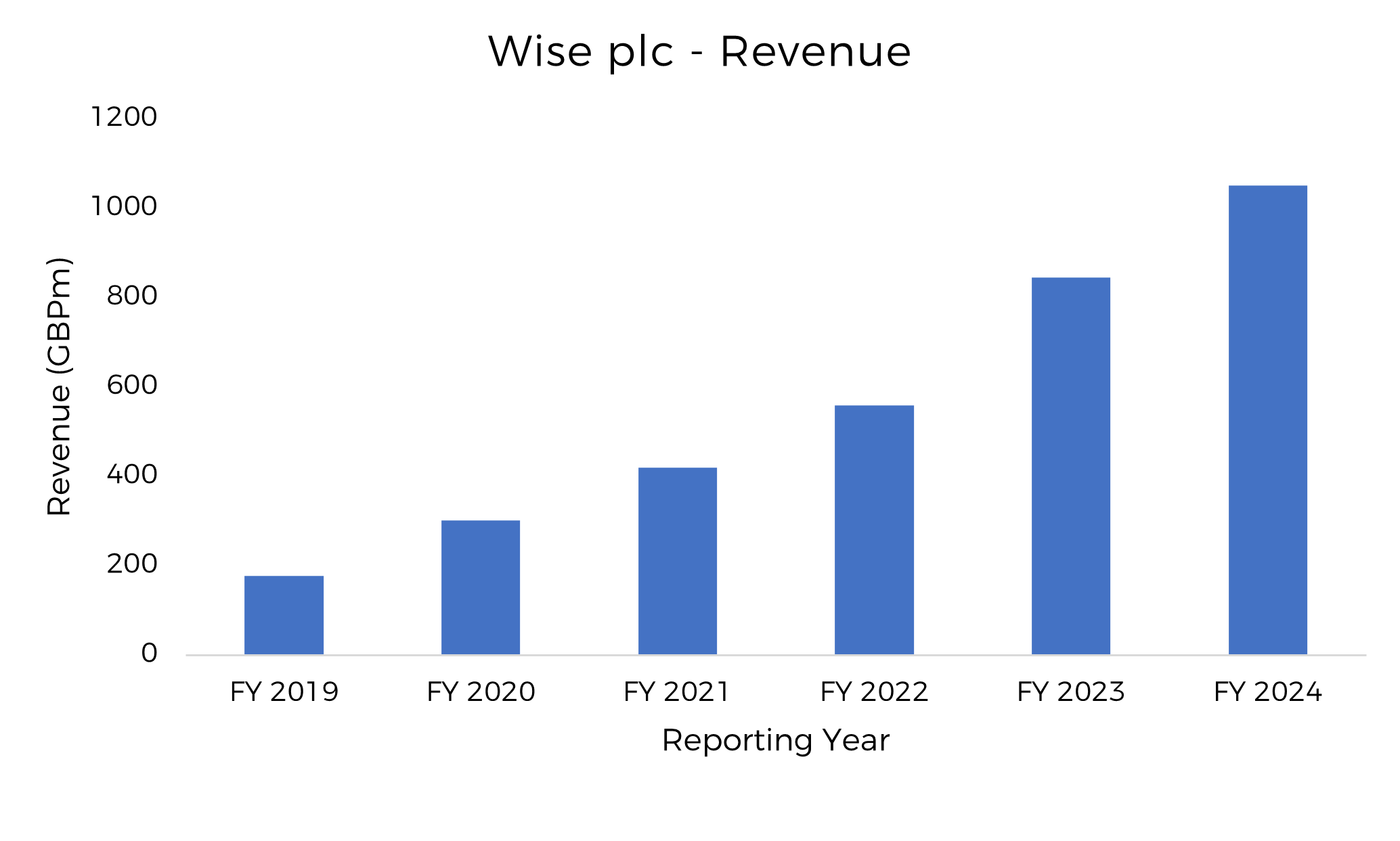
Premier Miton’s Jon Hudson, Fund Manager of he Premier Miton UK Growth Fund and Premier Miton Responsible UK Equity Fund, shares why he has strong conviction in the disruptive, tech-focussed company, Wise.
To many the UK stock market is the home of ‘old economy’ stocks such as banks, oil and gas companies, and miners, rather than the innovative and fast-growing companies found across the Atlantic on the New York Stock Exchange and the Nasdaq. While in some ways a caricature, it is not a completely unfair characterisation, with the UK stock market struggling to attract technology listings despite the UK itself being an incubator to many innovative start-ups. One exception to this stereotype is payments technology company Wise, which is at the time of writing one of the largest positions in the Premier Miton UK Growth Fund.
Despite a market capitalisation of over £8bn, Wise is not as widely known a stock market name as perhaps it should be. The main reason for this is that it is not a member of one of the major stock indices (e.g. the FTSE 100 Index or FTSE 250 Index). Wise’s corporate structure gives its founder influence over the company in a way that until now has precluded it from appearing in these indices, but this looks set to change. In an effort to make the UK stock market more attractive to companies looking to list, the FCA has changed the listing rules, which has made the route to appearing in these indices easier for companies like Wise. Should Wise opt to change its listing status and enter the FTSE 100 Index, more investors will be forced to pay attention to what we think is an exciting investment opportunity.
Wise’s business is focused on cross-border payments. It provides an increasingly vital part of the complex plumbing of the financial system, which is easy to ignore for the many of us who do not interact with it regularly. The market is huge, with Wise suggesting that the personal, Small-Medium Business (SMB) and large enterprise segments of the cross-border market amount to around £27 trillion a year.
Over the past 4 years, Wise’s customer base has increased almost threefold and profits almost eightfold as it continues its ambition of ‘building the best way to move and manage the world’s money. Min fees. Max ease. Full speed.’

Source: Bloomberg
Wise’s growth is coming at the expense of large legacy banks that have dominated the payments industry for decades. On average Wise charges its customers 0.59% to send money abroad compared to a global average of 6.35% according to The World Bank. Wise is transparent with its fees while banks often try to ‘hide’ them by offering less attractive exchange rates.
While Wise say price is the most important factor, customers also want to be assured their money will arrive at the destination. What may be underappreciated is the investment Wise has made building direct connections globally. This means less counterparties are involved in the process of moving money from one country to another, reducing the cost and the time it takes for a payment to reach its destination. 63% of payments are now instant, taking away anxiety for customers who might be worried where in the system their money is.
As Wise grows and becomes more efficient it seeks to share the benefits with customers by reducing the fees. In the last 12 months the average charge has fallen from 0.67% to 0.59%. No wonder its customers are evangelical. Two-thirds of new customers come via word-of-mouth. Businesses with these characteristics are rare.
Today Wise’s primary business is with direct customers transferring or spending money abroad through the Wise account or the Wise card, but Wise is increasingly looking to partner with other financial companies looking to use Wise’s superior infrastructure. Wise has over 850 engineers building a proprietary, modern, and fit-for-purpose technology platform that allows money to be moved much more seamlessly across borders.
It recently announced a partnership with UK listed bank Standard Chartered for its customers in Asia, who recognise it is better to use Wise’s infrastructure then rely on their legacy technology infrastructure conceived and designed many years ago. New challenger banks, such as Nubank in Brazil and Monzo in UK, have opted to partner with Wise rather than spend fortunes building their own. Wise believe over time their Platform business will be larger their direct business.
We believe the price proposition and infrastructure investments put Wise in pole position but as F1 fans will know, that alone does not guarantee victory. However, we believe the company has the right strategy and driver to achieve its ambitions. Wise was founded in 2011 by Kristo Kaarmann who remains CEO today and is laser focused on the mission. This may mean sacrificing potential profits today to increase the economic moat but given the size of the opportunity, if successful, shareholder returns could be significant. Other companies that have successfully shared the benefits of economies of scale with its customers include Amazon and Costco. We see far too often the temptation for management teams, often under pressure from capital markets and incentivised by their remuneration schemes, to maximise short-term profitability at the expense of draining the moat.
Wise is so sure of the competitiveness of its offering that on its website you can view Wise’s charges for a particular payment against a range of its competitors, including both other fintech firms and major banks. While Wise has some high-profile fintech competitors such as Revolut, its principle competitors remain the large legacy banks that have dominated the payments industry for decades. The grip of these banks on the market is such that there is room for multiple fintechs to take share from organisations that typically charge fees that are a multiple of Wise’s.
Success is never guaranteed, and time will tell whether building a position in the company was a wise (sorry) investment decision, but regardless it is good for the UK stock market to be enriched by a disruptive, tech-focused innovator.
Jon Hudson,
Fund Manager
